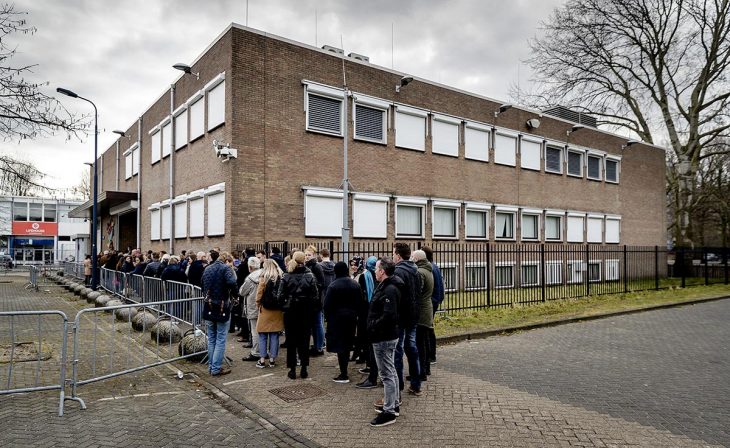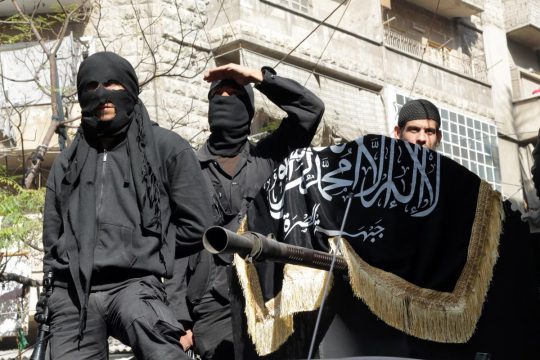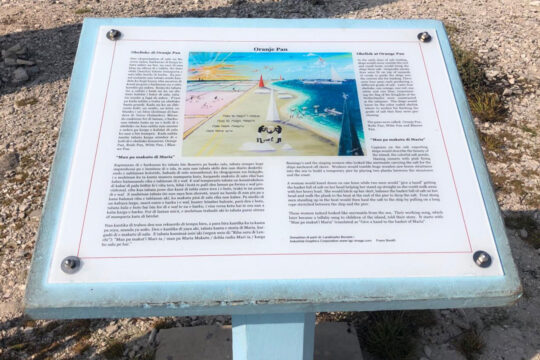Every three months since his arrest in May 2019 a judge reviews his case, pending his trial, which is expected to be held in 2021. Suspected of war crimes and membership of a terrorist organization, the 48-year-old is the first Syrian to be prosecuted under universal jurisdiction in the Netherlands since the Syrian revolution in 2011. This is a major step forward for the Dutch war crimes unit, which until now had only prosecuted Dutch nationals in connection with the conflict in Syria - obtaining a first conviction for war crimes against a former Islamic State member in July 2019. Universal jurisdiction is limited in the Netherlands, where the public prosecutor's office can only open an investigation if the suspect is on Dutch territory. The exiled Syrian population is smaller than in Scandinavia, France or Germany, which also explains why it is relatively behind on Syrian cases.
Former Syrian army officer Al-Khedr became "Abu Khuder" when he took up arms against Bashar Al-Assad's regime in 2011. He reportedly led the Ghuraba'a Mohassan ("Foreigners of Mohassan") unit in the eastern Deir ez-Zor region, which was first affiliated with the Free Syrian Army before forming an alliance with the Al-Nusra Front, a Syrian satellite of Al-Qaeda. After three years of war, he fled Syria with his family and sought refuge in the Netherlands, where he obtained a temporary asylum permit in 2014, hoping in particular to get treatment for his daughter, who is suffering from cancer.
"At that time, the Dutch administration had no evidence to suspect his past," explains Wieger Veldhuis, prosecutor in charge of the case. “It was information from the German police that put the Dutch on his trail years later. Testimony gathered in the context of an investigation in Germany details the role of a certain "Abu Khuder" in the Ghuraba'a Mohassan battalion, including his involvement in the extrajudicial execution of a Syrian army officer in July 2012. Ahmad Al-Khedr was finally arrested in Kapelle, a small town in the southern Netherlands, on 21 May 2019.
It is because of his group's alliance with Jabhat Al-Nusra that he is first charged with participating in and leading a terrorist organization. The prosecutor relies, among other things, on a 2012 Guardian report in which Abu Khuder recounts the circumstances of his alliance with Jabhat Al-Nusra. His battalion was trying unsuccessfully to attack a garrison of the Syrian army, entrenched in a former textile factory in Mohassan. A group of Islamist fighters offered to help, providing them with a truck filled with two tons of explosives, which they sent to blow up the stronghold. The next day, he told the journalist, the army had left, Mohassan was free. Disappointed by the disorganization and inefficiency of the rebel army, Abu Khuder is said to have quickly transferred his allegiance to Jabhat Al-Nusra. "We have evidence confirming this bomb attack, Abu Khuder's involvement and information that points to him as the commander of this armed group," says Veldhuis.
But Abu Khuder is also being prosecuted for war crimes, specifically for the execution of a Syrian lieutenant colonel in July 2012. This accusation is based mainly on a video broadcast on Internet, showing the soldier who is not in combat being executed with a bullet to the head. The person who shoots is not seen, but one can hear a dialogue between the victim and a man the prosecutor's office identifies as Abu Khuder. This would show that the accused was responsible for the execution and confirm his superior rank.
What kind of allegiance to Jabhat Al-Nusra?
Abu Khuder admits to having been present, but denies responsibility. According to his defence, he went to the place of execution in the hope of exchanging the prisoner with his two brothers, detained by the regime in Sednaya prison. The defence also refutes the terrorism charge, saying the accused only took up arms to fight the oppression of the Syrian people by the Al-Assad regime. Defence lawyer Andre Seebregts even told a court hearing on 2 September that his client lied to the Guardian journalist about being a member of the Al-Nusra front.
In fact, distinguishing the different degrees of involvement in the jihadist organization is not always simple. Many opposition fighters pledged allegiance to Jabhat Al-Nusra and other Islamist groups in the early years of the war, not necessarily out of adherence to their religious ideology but out of pragmatism, notes Uğur Üngör, a researcher at the Institute for War, Holocaust and Genocide Studies (NIOD) in Amsterdam and an expert on the Syrian conflict. Al-Nusra, like the Free Syrian Army, is an umbrella organization with multiple armed groups, he stresses. “When Al-Nusra came in with more money, more radical ideology, more radical action and violence, these existent FSA groups had a choice. Either you are displaced or you take on the black uniform and go on doing what you did but under the umbrella of Al-Nusra. Lots of people chose the first, lots of people chose the second.” “The town of Mohassan has a history of social mobilization, of class struggle,” says Üngör. And so Al-Khedr, himself from a working-class background, would have grown up in a city with a socialist or even communist culture, not very conducive to religious radicalization.
Combining terrorism and war crimes charges in Iraqi-Syrian cases involving armed groups is not entirely new, but a strategic trend among Dutch and European prosecutors that has been growing steadily, says a recent report by Eurojust's Network for the Investigation and Prosecution of Crimes of Genocide, War Crimes and Crimes against Humanity, which brings together specialized prosecutors from member States.
Following a meeting in The Hague last November, member States reaffirmed their will to continue this approach, saying that “cumulative prosecution of foreign terrorist fighters for terrorism-related offences, core international crimes and other crimes can ensure the full criminal responsibility of suspects, deliver higher sentences for the acts committed and lead to more justice for victims.” This strategy is applied especially in cases involving European citizens who went to fight abroad, but also in universal jurisdiction cases like that of Al-Khedr.
“It’s easier to find evidence of participation in a terrorist group than to provide evidence for an international crime charge," says Dutch prosecutor Nicole Vogelenzang. "But if there is evidence to prosecute a suspect for war crimes as well, it is our responsibility to do so." Wieger Vedhuis says it is also a question of "reflecting as accurately as possible the reality of the acts committed". “Even if we only have evidence of an attack on human dignity [such as photos of victims’ bodies], this degrading and humiliating treatment must be prosecuted," says Vogelenzang, "because that's what groups like Islamic State do: they use their victims as trophies. It's a war crime.”
If a suspect is found guilty on both counts, the sentences can be cumulative. Last July during The Netherlands’ first trial for war crimes and terrorism committed during the Syrian conflict, Osama Ashraf Akhlafa, a Dutch national, was sentenced to seven years and six months in jail, including more than two years for posing smiling beside a crucified man and sharing this image on social networks.
Terrorism, a broad and "easy" charge
In the case of Abu Khuder, the war crime charge is more serious. Suspected of being responsible for an extrajudicial execution, he faces possible life imprisonment. “There's a clear distinction between international crimes and terrorist crimes in the Netherlands. These are really two different laws,” says Thijs Bouwknegt, also a researcher at NIOD. “There's a law on international crimes and the ordinary criminal code includes the crime of terrorism. Basically, from the beginning most of the Syria crimes were being dealt with as terrorism. Because it's very easy; once a group – like ISIS – is widely considered a terrorist organization then you don’t need much evidence to prove an individual's involvement in the crime. The net of criminal responsibility is cast very wide, so to say. It seems prosecutors and judges felt uncomfortable with that.” Especially since the definition of a group as terrorist is inherently political, Bouwknegt adds, pointing out that the African National Congress was considered a terrorist organization by the United States and other countries, even after Nelson Mandela and his political party came to power in South Africa.
In the case of Syria, any armed opposition group can potentially be designated as terrorist by the Dutch prosecutor, and its members prosecuted ... even if the group has received political or financial support from The Hague. In the autumn of 2018, an investigation by national television and the daily newspaper Trouw revealed that the Jabhat Al Shamiya group had received "non-lethal" logistical support from the Netherlands because it was linked to the Free Syrian Army, described as a "moderate" opposition. At the same time, however, in prosecuting one of the members of the group, the prosecutor's office called the organization "jihadist", unwittingly confronting the state with its contradictions.
War crimes charge heavier and less political charge
“War crimes are of course political too, but the legal determination is less so,” says Bouwknegt. “So the type and amount of evidence required to tie an individual to committed war crimes requires more substantial evidence and is less dependent on political considerations. I think the prosecution tries to draw a line, and separate between what is seen as terrorism under Dutch law and what constitutes war crimes under international law. War crimes have a more solid and perhaps consistent base in law than terrorism.”
Apart from the Akhlafa judgment, currently under appeal, and the prosecution of Al-Khedr, two other Syrian cases involving terrorism and international crimes are ongoing in the Netherlands. The first concerns a Dutch national. The second is a Syrian, alleged commander of the Salafist group Ahrar Al-Sham, whose trial is also expected to be held in 2021.






